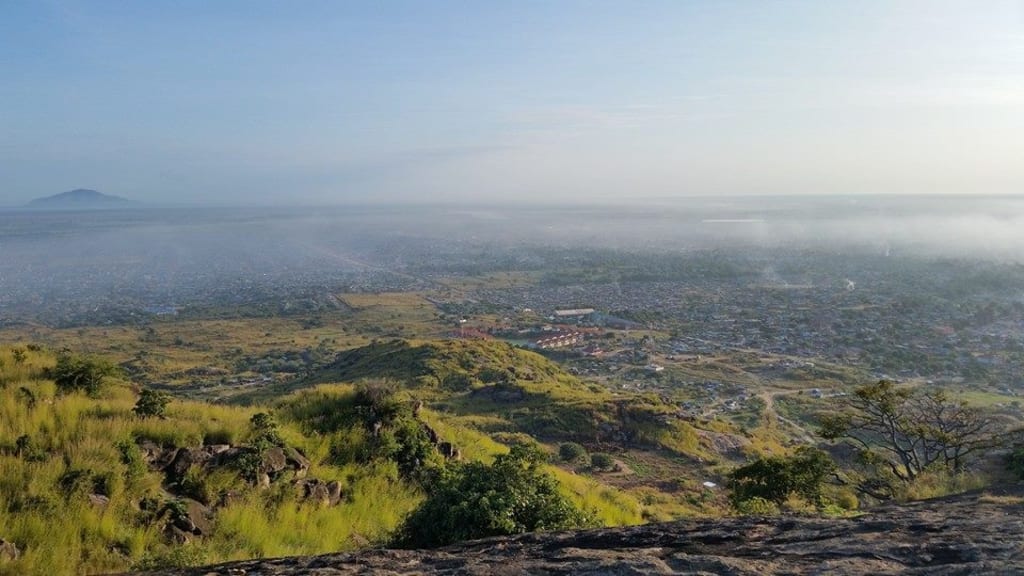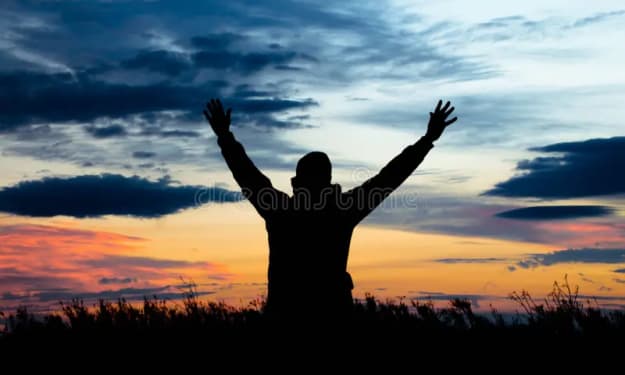The Man Outside the Box
A Collection in Humility

This entry was submitted for the Passing Ships challenge, and belongs to but one small moment in a collection of moments that formed my experience in South Sudan and my outlook on the world.
*********************************************************
Early 2014 - Juba, South Sudan
It was well past midnight while I stood inside the fortified nerve-center of the embassy. The magnetic lock on the heavy, blast resistant door clicked securely shut. I hated the stale air and fishbowl feeling of being in The Box. Post One - or as we called it, "The Box" - was placed at the main foyer of the entry into the embassy building itself. It was a glorified, reinforced receptionist booth for anyone seeking access to the inner halls of diplomacy abroad. It contained all manner of communications equipment, surveillance systems, detection and alarm equipment, and defensive countermeasures that the physical security of the embassy relied upon. Nobody entered past Post One without an inspection of credentials, appropriate authorization, and a Marine's hand thumbing a magnetic door lock under the counter.
I had just finished an interior patrol of the embassy, scouring the maze of hallways and offices. The only other soul present inside the building was the Deputy Chief of Mission, fervently typing a cable in his office. He was a remarkably studious and dedicated individual. He spent more time at the embassy than anybody, excepting the Marines.
The absence of late-night toil and bustle was not common for most embassies I had been to. I reminded myself that none of the others had been evacuated due to ongoing civil war and a highly-increased threat of violence, leaving behind the skeleton crew that was present here. Just weeks prior, the entire country of South Sudan found themselves separated along tribal and ethnic lines of an "attempted coup d'etat". The result was thousands massacred in a span of days; in the capitol, in outlying cities, and in remote countryside villages.
I had seen video footage upon my arrival of men engaged in a savage gunfight outside the embassy's walls, using concrete planters and barricades meant to direct traffic into the embassy's vehicle port as hard-cover. It ended with still, motionless bodies laying abandoned in the street. No comrades came to remove them. The survivors moved the fight elsewhere or fled entirely.
I later overheard a naïve diplomat say, "At least they're not shooting at us."
"Yet..." I found myself thinking.
Few realized how quickly tides could turn until they found themselves immersed in disaster. Surely a diplomat would be forecasting the potential effects of recent United States sanctions on oil from the northern fields of the country. It was one of South Sudan's only fruitful economic lifelines. Not to mention the withholding of humanitarian aid from both sides engaged in the conflict. I wondered if the diplomat understood how desperate people could really become when their civilizations collapse; when the hand that feeds withdraws and they are forced to survive of their own accord. Amidst the panic of mob mentality, friends can quickly become enemies.
I stared up at a bank of screens, scrolling through the closed-circuit television cameras arranged around the compound. My leg muscles began to cramp after walking and standing for hours, but I knew better than to seek respite. Not that the spartan furniture provided would give it, anyways. Lounging on Post One was frowned upon, to say the least.
A chatter of gunfire erupted in the distance, audible from inside The Box. I cycled to the camera on the northwest corner of the compound wall. It was the best guess I could make at the direction the gunfire had come from while ensconced inside. Almost immediately, the radio crackled.
"Post One, Rover One, sounds like its getting western down towards the police station, over."
The Marine Corporal assigned to the compound interior patrol could better make out the direction.
"Rover One, Post One. Copy that. That's the third time this week. Just stay alert. If it gets closer, I'll move you to the roof. I'm on the cams for now."
"These guys ain't got any quit in 'em," came the reply. Our conversation ended on that note, both of us knowing our Detachment Commander and the Regional Security Officer were likely awake at this point and could monitor the channel at any time.
The next few minutes were spent listening to fierce, small-caliber gunfire and the heavy, tell-tale thwump-thwump-thwump of crew-served .50-caliber weapons talking back and forth. The firing eventually pattered out, decreasing in tempo and intensity to sporadic bursts before it ceased completely. The newfound quiet remained haunted by the momentary tale of mortal struggle.
I imagined the carnage that had taken place outside the walls, amongst neighborhoods that were not my own. I panned and zoomed with the cameras, checking all the surrounding streets for the next twenty or so minutes, observing nothing unusual near our safe-haven. Perhaps the storm had really passed, if only for the night.
A flurry of motion in the pixelated darkness caught my eye. The man's shape grew more detailed as he ran full-tilt into the aura of the only street lights in the area. His cries were muted to me, but the visual of his frantic flailing limbs and gaping mouth told me he was running for his life. He made it to the middle of the street before he realized where he was, head snapping to the Seal of the United States of America emblazoned on the outer wall. Scaling the massive walls topped with rotating bars of concertina wire that formed the main defensive barrier of the embassy compound was out of the realm of possibility. His gaze focused on a single door in the wall.
At this time of night, the contracted local nationals that typically walked the sidewalks along the street providing additional security for the embassy were encamped inside the "personnel entry" hut. This structure was essentially another fortified box, but with direct access to the street. The guards were comfortably secured behind one of the magnetic doors I controlled.
Quickly realizing the unknown man's intent - and discounting the ability of the local nationals to remain disciplined - I flipped a switch, activating the magnetic lock. None could open the door now, though the man desperately tried.
Both hands gripped the metal handle on the door, body contorting as he pulled with all his might. He slapped his palms against the glass on the door. The local guards on the inside rose from their slumber in anger and embarrassment. They yelled and raised their weapons to the thick glass.
"Rover One, Post One! We got a local trying to force entry, front personnel entry, street level. Door's mag-locked. I don't see any weapons."
"Yeah, I hear a whole fuckin' lot of yelling!" I heard back over the pounding of his boots racing toward the hut.
I watched the screen as Rover One entered the hut from the interior compound door. He began yelling and motioning to the local guards to back away from the street door. He grabbed one by the collar, pulling him back while also pushing the barrel of his weapon towards the floor.
New motion caught my eye now as headlights streamed down the street. A Toyota Hilux with multiple uniformed men carrying batons and AK-47s screeched to a halt in the middle of the street. The men dismounted and strode toward their panicked prey.
"There's a whole fuckin' truck full of guys here!" came the announcement from Rover One. The pounding of his running feet was replaced by the pounding of pleading hands on the glass. Unintelligible screams emanated from the other side, sounding hollow and distant over the radio.
"I know, I see 'em!"
My detachment commander's callsign went unanswered on the radio as I attempted contact him.
I was rapidly dialing the regional security officer's private number while the scene unfolded before me. The first strike of a baton found the back of the man's calf-muscle. He collapsed on one knee, taking the metal door handle with him. The batons began to fly in a fury as I hit 'send'.
"They're beating the fuck out of him!" rang Rover One.
The man covered his head and went fetal, legs curling to chest. Hands grabbed hold everywhere they could. He was dragged kicking and screaming to the street and tossed unceremoniously into the bed of the truck. The uniformed men jumped aboard, holding their prisoner at bay. Tires squealed as the truck tore down the street and made a quick right-hand turn. The red tail-lights disappeared into the shadows.
It was over in seconds.
No time to second-guess or formulate alternative action. No time to gather more information or question the circumstances. No chance to seek guidance from higher authority.
They were all gone.
By the time I had the security officer on the line, it was over. I relayed what had transpired. He and our Detachment Commander were pulling into the compound in their armored vehicles within minutes. Rover One and I were debriefed inside The Box as they watched the footage playback. We were assured we handled everything exactly as we should have, in accordance with policies, rules of engagement, and expectations.
With the rising sun, tendrils of America's intelligence gathering apparatus spread throughout the city like weedy vines. A massive firefight between two "street-gangs" seeking to monopolize on already tragic circumstances had become embattled over the police station armory. Remnants of the police force had been caught in the middle. There had been casualties on all sides in what was described as a "bloody mess".
Try as they may, the masters of sleuthing and spying could neither identify nor locate the man from outside the box. Nobody claimed to know of his existence. The vehicle was not identifiable, nor the perpetrators. No witnesses existed in this wild west calamity except those of us on the inside of the box.
The local police chief denied any knowledge of the incident outside the embassy with the uniformed individuals and the man outside the box, as did all of his lieutenants. All he did say was that the city was rife with "rebel collaborators".
Furthermore, we could not identify exactly which uniforms were worn in the dim lighting. To be fair, uniforms of all sorts were easy to come by in third-world countries. In contrast, honorable law enforcement and military men men were not so easily found, and more easily paid for. The integrity and professionalism our police officers at home display every shift did not exist here. The public faith you entrust in them, wherever you are, did not exist there. Certainly not at that time.
The man's existence was punctuated with a giant question mark. Who was he? What had he done? What had he allegedly done? Was he an innocent man? Guilty? Did he have hidden weapons or intent? Who depended on him that would not see him through the door that night?
Was he summarily executed? Imprisoned and sentenced to hard labor? Sequestered in a filthy cell for the rest of his days? Dare I hope, pardoned and released after a grueling interrogation?
We would never know.
If I am honest, not knowing has helped. I'm sure whatever happened was not his ideal version of events.
He was relegated to an incident number and a couple-sentence synopsis, underlined in red. He was entered into a log book and filed away neatly. The case was closed with our duty faithfully performed and the embassy secure from intrusion. Any international incident borne by sequestering a fugitive was avoided. No ire of any local forces was garnered, ensuring neutrality continued.
But the case was not closed. That box will never close, no matter what type of locks are used. His desperation remains a memory that replays itself on sleepless nights. It is normal to ruminate on self-doubt and shortcomings at those hours, I've been told. When your spouse is soundly asleep and your pets are nestled at the foot of the bed and you are alone with your thoughts.
I've found myself often reflecting on my years abroad in Africa, and on my time in South Sudan, specifically. This was but one humbling moment, a drop in a river of swollen by the rains of exposure. There are too many drops to elucidate on in this passage. Many ships passed me in that time. All of them were just as humbling; many of them were tragic in their own vein. Trust that I saw and learned many things that made me feel lucky beyond words to be American.
Lucky to have basic needs met, like hunger and running water. Lucky that I grew up in a community that wasn't ravaged by senseless violence. Lucky to have a hospital to go to, services to rely on.
By this time, the word 'privilege' had begun to rear its ugly head in society. My experiences made me realize that if you won the birthing lottery, you were more privileged than you would ever realize. It made me realize how many people take that fact for granted. Perhaps if more people traveled and saw what the world was truly like, they wouldn't play the victim so well.
My thoughts on the matter always culminate in the same manner. The assurances after that debrief in The Box felt so solid in the moment. It was unquestionable. I had acted on the information available, in the heat of the moment, during such a quick escalation and closure. I had explicitly defined rules, expectations, and responsibility.
But time wears down all things, especially a tormented conviction. The question persists.
Even if he didn't make the right choices...
Did I?
*********************************************************
Some context for the reader:
South Sudan, demographically united by Christian believers - but separated by two distinct ethnic tribes, Dinka and Nuer - gained independence from Sudan and its Islamic government seated in Khartoum on July 9th, 2011. Though combative hostilities had ended in 2005, the leaders of the estrangement cited continuing religious persecution and economic freedom as major factors for a continued formal separation.
The celebration and peace was short-lived. In December 2013, South Sudan's President, Salva Kiir, ordered the ousting of his top military general, Riek Machar. Kiir swore he was pre-empting a coup d'etat planned by Machar. Machar claimed Kiir was paranoid and giving too much credence to rumor.
Exacerbating whatever truth lay at the bottom of obfuscation's pit, one was Dinka, and one was Nuer. Loyalists quickly fell upon tribal lines.
The ensuing tragedy and ethnic violence was reminiscent of the Rwandan genocide of 1994. Thousands were killed, accurate numbers untold. Millions were displaced into refugee camps in the region. However, instead of a few months time, this new conflict would last for years to come.
About the Creator
Brannan K.
****Vivid prose and thrills****
Favorite Reads:
Terry Brooks - The Shannara Trilogy
J.R.R.Tolkien - Lord of the Rings
James Rollins - Ice Hunt
Ernest Hemingway - The Sun Also Rises
Cormac McCarthy - Blood Meridian
Reader insights
Outstanding
Excellent work. Looking forward to reading more!
Top insights
Compelling and original writing
Creative use of language & vocab
Easy to read and follow
Well-structured & engaging content
Excellent storytelling
Original narrative & well developed characters
Expert insights and opinions
Arguments were carefully researched and presented
Eye opening
Niche topic & fresh perspectives
Heartfelt and relatable
The story invoked strong personal emotions
Masterful proofreading
Zero grammar & spelling mistakes
On-point and relevant
Writing reflected the title & theme






Comments (4)
The way you write is mesmerizing! Honestly. I felt like I was there with your amazing descriptions! “It ended with still, motionless bodies laying abandoned in the street.” 🥺 I can only imagine how difficult situations like this must have been; thank you so much for sharing! With that said, your knowledge and writing style makes a captivating combination. Well done!
I can only imagine how difficult it must have been for you to write this story. With that being said, I hope writing this made you feel better. Thank you for sharing this story with us!
The ravages of war echo indefinitely. Thank you for sharing your story, the honesty, the conflict you still feel. I do hope you find peace.
It takes so much courage to tell a story like this knowing that you will likely open yourself to criticism and judgement. But it's easy to judge from the comfort of home so if anyone in the comments say anything against you, know that they could not hope to understand. I hope telling thos story helps lift a weight off your shoulders. Thank you for sharing it with me.